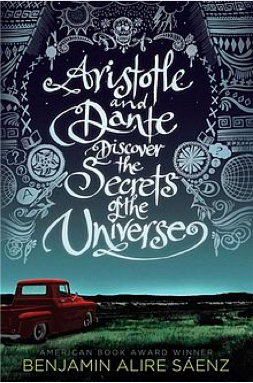Aristotle and Dante Discover the Secrets of the Universe
- lcollins29
- Apr 27, 2017
- 3 min read

Title: Aristotle and Dante Discover the Secrets of the Universe
Author: Benjamin Salire Sáenz
Publisher: Simon & Schuster
Publication Year: 2012
Professional Source: My best friend’s mother
Genre (subcategory, if appropriate): Contemporary Tales
Audience: Young Adults
Awards: Stonewall Book Award, Michael L. Printz Award
Critical response:
Aristotle and Dante Discover the Secrets of the Universe is a coming of age novel that is even more intriguing than its title. It is the story of two fifteen-year-olds, Aristotle “Ari” Mendoza and Dante Quintana, and their developing friendship over the course of two years. As Aristotle and Dante slowly get to know each other and together they seek to find the key to being satisfied with themselves, they realize that happiness is found when you love someone and they wholeheartedly love you in return.
This story is definitely meant to appeal mainly to young adults. Its narration is a prime example. It is told from Ari’s first person perspective, and much of it has an easygoing tone and utilizes fragments. The words on the pages really do sound like they bare coming from the mind of a teenager. “I wondered how that felt, to really like yourself,” Ari says, “And I wondered why some people didn’t like themselves and others did. Maybe that’s just the way it was.” (74-75)
Liking yourself, or your identity, is one of the active themes at work within this story. Others include homosexuality and family relationships, making this a domestic story overall. Ari feels disconnected from his family most of the time. His father served in the Vietnam War and suffers mentally because of it, his two older sisters are twelve years older and don’t interact with him, and his older brother is in prison and no one talks about him. Because of all of this, Ari feels trapped and wants to experience freedom. He is not sure what exactly he wants to be free from or how to secure his freedom, but what he does know is that “[he] didn’t want to live in [his] parents’ world and [he] didn’t have a world of [his] own.” (81)
Readers will be able to recognize Ari as a developing child from the way that he begins the book a closed off, emotionally-guarded character and grows into a slightly more mature, open character, eventually realizing that the reason he feels so upset a lot of the time is because he is suppressing his love for Dante instead of allowing their relationship to flourish.
Though the book is not obviously didactic, its themes of sexuality can be educational to all young adults, regardless of what they identify as. Those struggling with homosexuality will be able to see themselves within Ari’s character and know that they are not alone. As he finally accepts that he is in love with Dante, Ari says to his mother, “What am I going to do? I’m so ashamed…I’m a guy. He’s a guy. It’s not the way things are supposed to be.” (349) This line demonstrates the internal fear that Ari refuses to acknowledge—the fear that his family and society will reject him for feeling this way. For people who identify as heterosexual, this book can be a window into some of these struggles.
What is interesting about Dante’s character is the fact that the is presented as an unconventional boy and it is a good thing. Dante is extremely sensitive, compassionate, and unafraid to show his emotions. He allows himself to cry whenever he feels like crying (which is often) and he speaks his mind without censoring his thoughts, practically confessing his love for Ari on more than one occasion. Usually in stories, these qualities are a bad thing, and the boy is made fun of for it. But when reading the book through Ari’s eyes, readers get to see the beauty and wonder that comes from Dante’s personality.






Comments